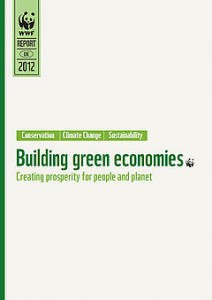Building Green Economies (WWF)
Building Green Economies / World Wildlife Fund (WWF) / October 2012
 This comprehensive report gives an overview of why it is urgent to begin the transition to a green economy.
This comprehensive report gives an overview of why it is urgent to begin the transition to a green economy.
Read report
The first part of this report from WWF sets out why the transition to a green economy is so urgent. There are huge disparities in income, 1 billion living in poverty, economic crisis and high levels of unemployment. Alongside this we are seeing rising emissions of greenhouse gases with the prospect of devastating climate change and unprecedented biodiversity loss.
This is summed up as “Our current economic, social and environmental problems are inextricably linked. They result primarily from market and government failures, whereby the benefits of pursuing short-term economic gain are outweighed by costs to society as a whole, future generations and the natural world.”
In the search for growth there is a danger governments will be tempted to “promote public and private investment in existing, high-carbon and resource-intensive technologies, infrastructure and business models.” This would be a missed opportunity to start the transition to a green economy
WWF notes it’s difficult to define what the green economy is because it “can mean different things in different contexts to different people” but they propose “Green economies improve people’s wellbeing, and restore, maintain and enhance the healthy natural environment that people and other species need to survive and thrive.”
WWF says the social equity must be part of a green economy and their objective should be “to achieve equitable, sustainable human development. In green economies, economic growth would not be an end in itself”.
There is analysis of key questions at the heart of debates on the green economy including
- Can we make poverty history without stressing the planet?
Could this be done by a small redistribution of food and wealth to reduce inequalities?
- Green Growth: holy grail or contradiction in terms?
Is it possible to decouple growth from environmental impacts? Would ‘closed loop’/circular productive systems allow for re-use and recycling of materials?
- Should we put a price on nature?
Can we factor nature into economic decision-making by recognising the environment’s ‘hidden values’ and services through economic valuation? Or will this lead to the extension of markets and commodification of nature which holds intrinsic value?
WWF concludes “the natural environment has many different values, only some of which can be usefully measured in monetary terms” and that “governments should move beyond cost-benefit analysis based solely on monetary metrics, and towards multi-criteria analysis”.
There will be many ways to achieve a green economy. It will require a cultural shift to long-term thinking (for future generations) with all stakeholders providing complementary top-down and bottom-up solutions. Governments should facilitate change by ‘greening’ public procurement, taxes, subsidies and embedding natural capital into decision-making. Alongside this will be new business models and community initiatives.
A key component of a future green economy is the concept of natural capital which seeks to value nature. WWF is involved in several initiatives to promote this idea:
The Heart of Borneo study that concluded shifting to a green economy would be better in terms of growth and environmental conservation than business as usual:
http://www.hobgreeneconomy.org/
Natural Capital Project: Along with The Nature Conservancy, Stanford University and the University of Minnesota WWF developed a free open source software tool called InVEST to “map, quantify and value the impacts on nature’s benefits in the context of land use and marine spatial planning, strategic environmental assessments, climate adaptation strategies and business strategy and operational decisions”. This tool has been used in various countries to aid decision–makers to assess the impacts of different scenarios on services that ecosystems provide to people.
http://www.naturalcapitalproject.org/
WWF also supports the Natural Capital Declaration – signed by actors from the financial sector – that seeks to include natural capital in lending practices and investment decisions. The signatories are from the financial sector.
http://www.naturalcapitaldeclaration.org/
Read report
————————————
This summary was prepared by Why Green Economy?. The views expressed have been paraphrased. See the original source for more information.

Leave a Reply